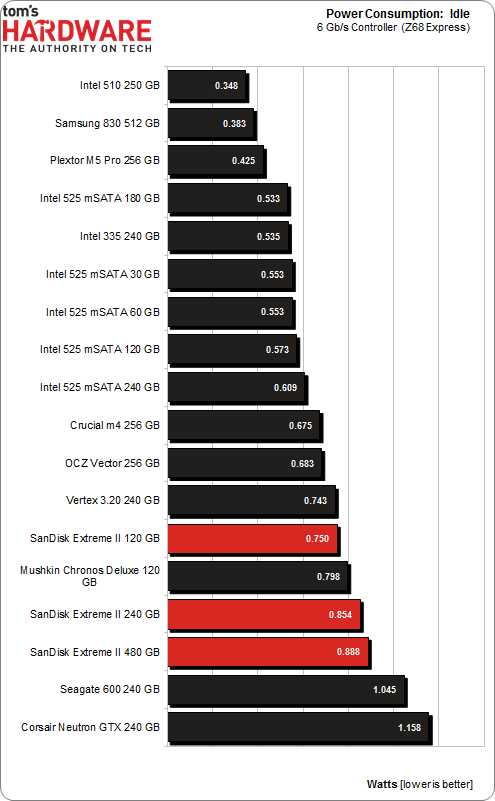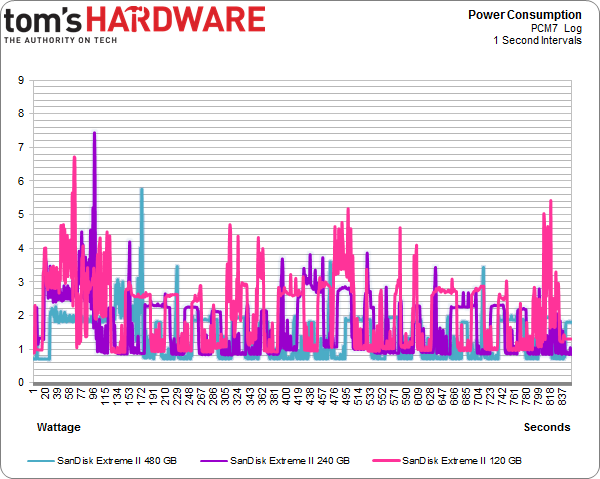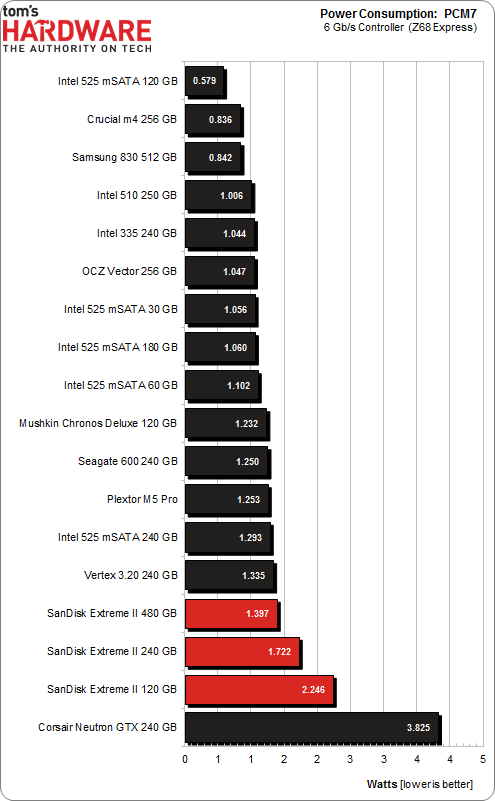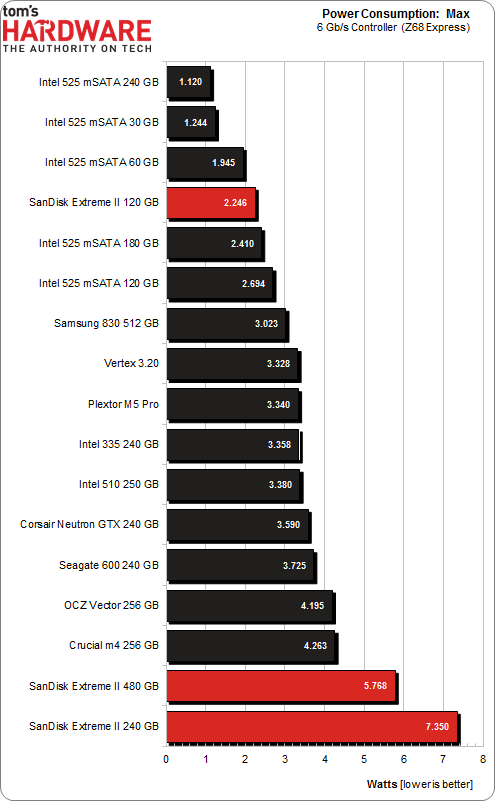SanDisk Extreme II SSD Review: Striking At The Heavy-Hitters
SanDisk is looking for a rise to prominence in the SSD segment with a new Marvell 88SS9187-based drive. The Extreme II packs 19 nm Toggle-mode NAND (from SanDisk, naturally), specialized firmware, and intriguing performance potential. How does it compare?
Results: Power Consumption
Idle Power Consumption
Idle consumption is the most important power metric for consumer and client SSDs. After all, solid-state drives complete host commands quickly, and then drop back down to idle. Aside from the occasional background garbage collection and house keeping, a modern SSD spends most of its life doing very little.
Enterprise-oriented drives are more frequently used at full tilt, making their idle power numbers far less important. But this just isn't the case on the desktop, where the demands of client and consumer computing leave most SSDs sitting on their hands for long stretches of time.
It might turn out that the only issue with SanDisk's Extreme II we stumble across is higher power demands. The idle numbers are a little above average, but still within a reasonable range.
PCMark 7 Average Power Consumption
A log of our PCMark 7 run shows higher-than-average power spikes, both in intensity and frequency. Still, we're not calling this a big deal yet.
The Extreme IIs fall to the back of the pack in average PCMark 7 power consumption. Only Corsair's Neutron GTX fares worse on average. The 120 GB Extreme II surprisingly finishes second-to-last, suggesting that the smallest family member has to work harder in this benchmark, despite the higher peak power consumption seen from the 240 and 480 GB models.
Get Tom's Hardware's best news and in-depth reviews, straight to your inbox.
Maximum Observed Power Consumption
These results just aren't as important for consumer SSDs. It's rare you see drives pulling down this much power for anything more than a few seconds per hour.
Current page: Results: Power Consumption
Prev Page Results: PCMark Vantage And PCMark 7 Next Page Not Extreme To The Second Power, But Close Enough-
Someone Somewhere Where's the 840/840 Pro?Reply
Also, you appear to have put one of the labels back on the wrong way round. -
boulbox I have always been a fan of Sandisk SSDs, can't wait until to try this out in someone else's build as they usually sell their products that is very acceptable for budgets.Reply -
slomo4sho I am also curious about the selection of the comparative models. Having the Extreme (not II) in the charts for comparison between the two generations would have been a welcomed addition along with the inclusion of the 840 series.Reply -
flong777 I know a lot of people have already pointed this out but can't Tom's Hardware afford a damn 256 GB 840 Pro? I mean come on, it is the fastest SSD on the planet right now.Reply -
raidtarded Seriously, what is the point of this article? The fastest car in the world is as Yugo if you dont test against a Lamborghini.Reply -
teh_gerbil Why are there 2 of your most recent SSD reviews lack the Samsung 840/Pro? Are you being paid by the respective companies to avoid using them, as for both SSD's, as per other reviews I have read, the 840 Pro cr@ps all over both of them, but due to your lack of them, they're both top of your benchmarks! Very very bad benchmarking.Reply
http://www.tomshardware.com/reviews/vertex-450-256gb-review,3517.html -
merikafyeah Want an 840 Pro comparison and far more in-depth review?Reply
See here: http://www.anandtech.com/show/7006/sandisk-extreme-ii-review-480gb
It's Anand's new favorite SSD, and based on the results, I'm inclined to agree.
It's peak performance is right up there with the 840 Pro, but what's really extreme is the drive's consistency. It's performance when the drive is close to full is unmatched.
There are no high peaks accompanied by low valleys in performance when it comes to the Extreme II. It's pretty much smooth and fast sailing all the time, which in my book, places the Extreme II a step above the 840 Pro. The 840 Pro would have to be at least $30 cheaper than the Extreme II for me to even consider it over the Extreme II.
-
JPNpower Why is the 840 Pro the fastest SSD on the planet? It has its share of drawbacks, and is slower than the OCZ Vector, and the Plextor M5 Pro Xtreme on many benchmarks. Don't make broad statemets that aren't always true.Reply



